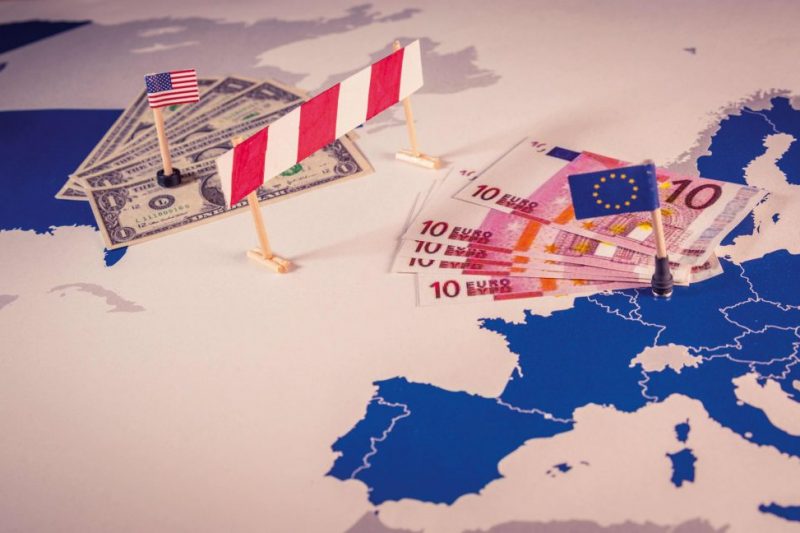EU and Chinese trade tariffs on US among key global regulatory moves

Confectionery consultants Keith Nuthall, Laura Syrett and Diana Yordanova provide our regular view on key events in global regulations for the sector
China’s ministry of commerce has imposed retaliatory duties on exports of USA-made confectionery ingredients, namely nuts and soft fruit, following the USA imposition of 25 per cent and 10 per cent duties on imported steel and aluminium. Beijing has imposed 15 per cent tariffs on American-made coconut (including dried products), cashew nut, almonds, hazelnuts, walnuts, chestnuts, bananas, dates, figs, mangos, cherries, strawberries, apricots and more.
Meanwhile, with the USA having suspended its duties on European Union (EU)-made steel and aluminium, the EU has threatened its own retaliatory duties, which have now been implemented. If Washington lists its suspension, these would include EU duties on peanut butter and cranberries.
EU chocolate exporters could be major beneficiaries of a revised EU-Mexico agreement which will remove almost all bilateral tariffs left in place by a year 2000 deal. Under a new agreement struck in principle, Mexican import duties on EU exports of chocolate and confectionary, (that can exceed 20 per cent), will be removed. Also, Mexico import duties on confectionery ingredients such as apples and canned peaches (up to 20 per cent) will be scrapped. The EU will remove duties on Mexican exports of such products. The agreement will also streamline customs procedures for trade between the EU and Mexico.
For its part, The European Commission has proposed amending EU directive 2005/29/EC on unfair business-to-consumer commercial practices to outlaw the marketing of a product as being identical to the same product sold in several other EU member states, where those products have significantly different composition or characteristics.
The reform follows claims that confectionary and other food manufacturers sell products of a lower quality in eastern Europe, compared to western Europe, even though they are sold under the same brand name.
EU sugar production and exports have continued to rise in the first year without restrictive production quotas said a European Commission report, although the European Association of Sugar Manufacturers (CEFS) is warning prices are falling so low, production in Europe could fall sharply – and soon.
Sugar production
EU white sugar production in 2017/2018 is estimated at 21 million tonnes, 23 per cent above the average of previous years, with exports up. These reached almost 1.3 million tonnes in the first four months of the marketing year Exports over the first four months of the marketing year (October-January) equalling average annual EU exports in recent years, with sales to sub-Saharan African and south and east Asian countries surging, and new export destinations emerging, such as Chile and Haiti.
However, the association is warning EU production may fall this year. While EU sugar prices remained stable most of 2017, around EUR500/tonne, they fell to €400/tonne in December 2017, and then – according to the association, to 372 EUR372/tonne in February (2018). This, it said “is far below EU average production costs”, with prices “not sustainable for beet and sugar production”.
CEFS claims that the European Commission is holding a firm line in trade negotiations with South America’s Mercosur bloc (which includes major sugar exporter Brazil), over sugar duties allowed in the deal.
CEFS said the commission is offering Mercosur countries an annual tariff-rate quota of 100,000 tonnes of sugar at €98/tonnes duty, which would “level the playing field somewhat between the EU and Brazil,” argued CEFS, which has complained of Brazilian government subsidies for Brazil’s sugar sector, linked to its production of ethanol fuel.
An EU standing committee has approved a European Commission proposal to ban the outdoor use of three active neonicotinoids substances (imidacloprid, clothianidin and thiamethoxam) because of scientific studies concluding that the chemicals harms honey bees. Their use will only be allowed in the EU within permanent greenhouses where no contact with bees is expected. The ban will be implemented by December (2018).
It has not been welcomed by CEFS, which opposes the ban including neonicotinoid seed treatments in sugar beet growing. “The current use of such seed treatments in sugar beet is safe and represents a very low risk to non-target organisms, including pollinators,” claimed the association.
A report supported by the UN Environment World Conservation Monitoring Centre (UNEP-WCMC) has warned that bees and other insect pollinators generate USD577 billion in value worldwide through honey, fruit and other vegetable production.
With more than a third of wild bee and butterfly species facing local extinction, confectionery and other food manufacturers face serious production threats, warns the report – see https://www.cisl.cam.ac.uk
Food trade deal
A new food trade deal between the EU and Iceland will increase the amount of an Icelandic dairy yoghurt-style snack called ‘skyr’ that can be exported to the EU from 380 tonnes today to 4,000 tonnes in four years’ time. It will also increase the amount of Icelandic butter that can be exported to the EU from 350 to 500 tonnes.
A UK government inquiry has found that British soft fruit farmers are facing labour shortages as Brexit concerns deter seasonal EU workers from coming to the UK. The inquiry highlighted findings by association Apples and Pears Ltd that 60.4 per cent of top UK fruit growers were short of labour in 2017. Around 29,000 EU foreign nationals are employed on UK farms, many on fruit farms.
The European Bank for Reconstruction and Development (EBRD) has helped Moroccan sweets and chewing gum manufacturer Maghreb Industries to modernise its corporate governance and develop a new branding and export strategy. The EBRD matched the company with international consultants, helping the company improve its procedures, standards and protocols. It is now developing new packaging design and a new website.
The European Commission has approved the acquisition of Unilever’s Netherlands-focused baking, cooking and spreads business by US-based investment company KKR.
The EU has complained at a meeting of the World Trade Organisation (WTO) sanitary and phytosanitary measures committee about ongoing USA health-based restrictions on EU exports of apples and pears. Washington said it was actively considering allowing imports from Italy. Spain France, Germany, the Netherlands, Portugal, Belgium and Poland.



